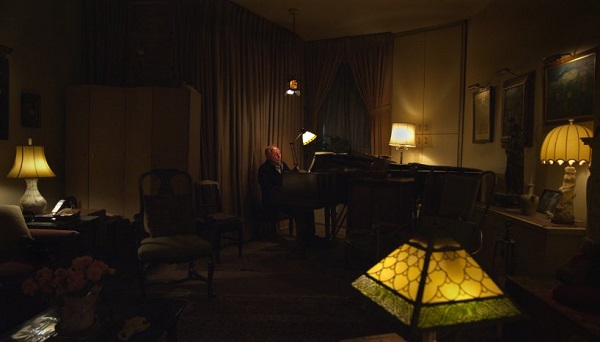
Directed by Ethan Hawke
USA, 2014
Amidst the chaos and uncertainty of an indifferent universe, virtuoso pianist Seymour Bernstein found order in his music. Ethan Hawke’s new documentary, Seymour: An Introduction, follows the reclusive Bernstein as he prepares for his first live performance in 35 years. Through powerful ruminations on his craft, we glimpse the inner workings of an artist whose love for music permeates every fiber of his being. Hawke gives us a terrific primer on one of classical music’s most talented and confounding figures.
“The real essence of who we are resides in our talent,” Bernstein reflects early in this free-flowing documentary. From an early age, he did everything in his power to nurture that talent; practicing prodigiously and challenging himself to compose new music every day. By his own admission, Bernstein never acclimated to life in the spotlight, as he struggled with stage fright and bristled at the pressure placed on artists to be commercially viable. So, at the tender age of 50, he retired from public life and absconded to the single-room apartment that has been his sanctuary for nearly 60 years. Indeed, Bernstein resembles a monk; cloistered amongst his compositions and musical artifacts, he occasionally imparts his life wisdom to young, impressionable disciples. He keeps the faith in his own quiet way, and strives to find divinity in a craft that demands your soul in exchange for enlightenment.
Seymour is undoubtedly bolstered by the self-imposed exile of its hero. At a time when everyone is desperate to be famous, how could such a brilliant artist willingly turn his back on stardom? Hawke gives Bernstein a wide birth to answer this question, allowing him to dole out clues and misdirection at his own leisurely pace. This relaxed approach is both a strength and a weakness for Hawke’s creation. You don’t want to push an introspective, gentle spirit like Bernstein too much, but you can’t allow him to disappear inside his contemplative construct, either. The closest anyone comes to challenging his isolationist worldview is a former piano student, who wonders aloud if Bernstein has done the world a disservice by hoarding his artistic genius. Bernstein replies with the assuredness of a man who has often interrogated his own psyche; “I poured it into you.” His students have become the conduit through which his genius shall be known.
With a title (most likely) inspired by a J.D. Salinger book that’s known for its meandering, it comes as no surprise that Hawke forgoes any formal structure for Seymour: An Introduction. Yes, Hawke imposes a loose narrative urgency—Bernstein’s preparation for his first recital in 35 years—but mostly this is a leisurely stroll accompanied by some gorgeous music. There is praise from contemporaries and admirers, as well as Bernstein’s own recollections of a life lived from the inside out. His measured demeanor waivers only once, as he recalls the diary entries written for his fallen comrades in the Korean War. Here, you see the foundation of the precision and passion that makes his music so powerful. This is a man whose discipline presides over all things; his craft, his spirituality, his life. By connecting everything to music, he instilled continuity to a mercurial world. He survived because the music inside him needed to be heard.
Though it would be nice to see more clearly the price Bernstein paid for this self-actualization, that’s not the story that Hawke is here to tell. This is the story of a mentor; a man who not only teaches his students about their craft, but actually listens to what they’re saying about the experience. It’s a communication, not of words, but of body language—their breathing or tightening shoulders, or inability to maintain a steady cadence. Bernstein uses the piano as a tool to find the feelings buried beneath the surface. Yet, even as Bernstein toils for hours at his bench, he hasn’t outgrown the joy of musical discovery. He delights at finding a new piano (“The best I’ve ever played!”) or reconnecting with his favorite Schumann piece. Hawke beautifully captures a man who is both driven and sustained by his lifelong task master.
When he says, “I never dreamt that with my own two hands I could touch the sky,” Seymour Bernstein celebrates the spiritual enlightenment that comes from finding your life’s calling. Bernstein knows that for inspiration to fully blossom, we must first possess the wisdom to recognize it. Watching his arduous quest to attain this wisdom is both uplifting and intimidating. Luckily, Seymour: An Introduction provides plenty of musical encouragement to never stop searching for the creative spark inside of us.
— J.R. Kinnard



